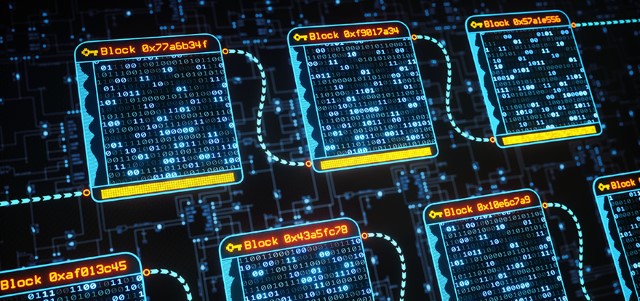What Is a Blockchain, and Why Should I Care?

If you own crypto assets, or are considering doing so, it’s valuable to have at least a basic understanding of blockchain, the technology protocol that powers most cryptocurrencies, including bitcoin and ethereum. FINRA and the BBB Institute are sharing some basic information about blockchain to help you understand how your assets are recorded—and also recognize and avoid investment schemes that might reference blockchain technology in an attempt to lure you into sending money.
What Is Blockchain?
Blockchain is a type of distributed ledger technology that uses computer code to create, maintain and update information shared by blockchain participants. Each "block" is a chunk of encrypted data, which is secured, or verified, by cryptography (the Greek word kryptos means hidden). A block might be one or more crypto transactions, or a loan payment, for instance. When one block of data is verified, it's then “chained” to the previous block, creating a blockchain.
Blockchain technology is an alternative to records maintained on a central database. With blockchain, risk and management are shared among numerous participants, each of whom has a "node" on the network and works collectively to maintain a permanent list of transactions. All parties on the network have access to a shared, identical, irreversible ledger of transactions. In other words, each node participates in the administration of the blockchain, including the verification of new additions to the blockchain.
Each node also is capable of entering new data into the database. To add new information to the blockchain, the majority of nodes must reach consensus, which enforces the network's security. Because there’s a permanent, transparent record of a transaction on the blockchain, the technology prevents a user from duplicating or double-spending their bitcoin.
Attractive Technology
Blockchain technology excels in moving data securely and transparently. It also offers data safeguards: Records on a blockchain are nearly impossible to alter, making it difficult for a central authority, or bad actor, to falsify or change information. Blockchain technology is also well-suited to tasks associated with identity verification and data tracking.
Because of these strengths, use of blockchain technology extends beyond the financial sphere. Hospitals use blockchain technology to safeguard patient data. Global vaccines, including COVID-19 vaccines, are being tracked and distributed with the help of blockchain technology. And individuals can employ blockchain solutions to verify home or land ownership and create a lifetime portable identity that doesn't depend on a centralized authority.
Blockchain, Hype and Fraud
Blockchain has captured the attention of many people who view it as a potentially transformative technology. Unfortunately, fraudsters love to jump on trends, including blockchain technology, and aggressively target consumers with a variety of scams.
Be wary of companies that try to mislead or overstate their role in blockchain technology. Don’t invest based solely on a tout or tweet, which can easily overstate a company’s role in the blockchain arena. At the very least, read a company’s annual and quarterly reports. The Securities and Exchange Commission (SEC) has taken action against companies that have made false and misleading statements about blockchain technology in an effort to pump up the price of the stock.
This isn't a new kind of fraud—it's the same old story where a company takes advantage of a hot trend, changes its name and makes baseless claims to attract new investors to pump (or ramp), then dump, the stock. Scammers have also posed as legitimate websites that provide services to crypto asset users to target unknowing users.
Always Use Caution
Most investors aren’t experts on blockchain technology, so it’s important to be skeptical when evaluating a claim made by a company about its entry into this arena. As a general rule, steer clear of unsolicited investment offers—and always take the time to verify whether the company has registered its securities with the SEC.
Learn more about crypto assets. Find more consumer resources from the BBB.



